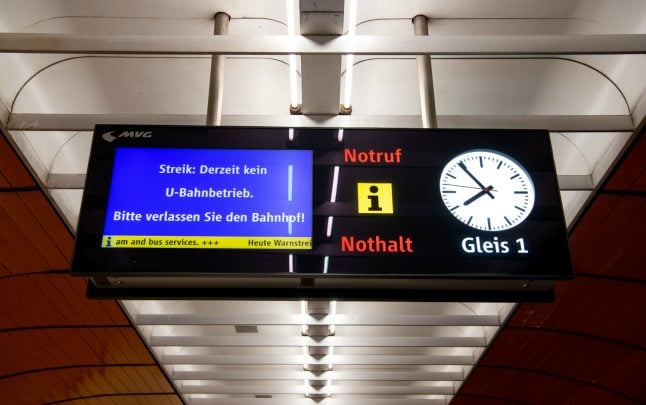Berlin, Hamburg, the Hanover region, Magdeburg, Kiel, Munich, Dresden, Leipzig, Freiburg, Konstanz, Mainz and Erfurt are among the cities affected, reported Spiegel.
U-Bahn trains, buses and trams in cities were running at extremely limited capacity or not at all in the so-called 'warning strikes' being held in a dispute over working conditions and pay.
READ ALSO: Commuters face chaos as public transport workers strike
Commuters urged not to travel unless necessary
Strikes in many regions including Brandenburg and Saxony are expected to last for 24 hours from 3am on Tuesday. However, the action is scheduled to last until 12noon Tuesday in some places, including Berlin.
Public transport firms across Germany called on travellers to only travel if it was necessary, or to switch to other means of transport.
The action is not affecting S-Bahn services (such as those in Berlin and Munich) or regional trains.
In Mecklenburg-Western Pomerania, pupils who have long journeys to and from school do not have to attend lessons on Tuesday if their bus or tram isn't running.
On Tuesday morning, many union reps and workers stood on picket lines with posters.
Dienstag Morgen, seit 3 Uhr streiken die Beschäftigten im Nahverkehr @dieLinke & @Linksfraktion sind solidarisch #tvn2020 #warnstreik pic.twitter.com/YYsYy6giWA
— MdB Sören Pellmann (@LINKEPELLI) September 29, 2020
The trade union Verdi called for the action in order to enforce a nationwide collective agreement for some 87,000 public transport workers. The union is calling for regulations on overtime compensation and allowances for shift work.
 A man waiting at a bus stop in Dresden. Photo: DPA
A man waiting at a bus stop in Dresden. Photo: DPA
They are also demanding measures to relieve the increasing strain felt by employees during the coronavirus crisis, such as extra leave or special bonuses, as well as policies focussing on the recruitment and development of young workers.
How is the strike affecting cities and regions?
In North Rhine-Westphalia alone, where the working conditions of 30,000 workers are at stake, Verdi believes more than 10,000 people are taking part in the warning strike over the course of the day, according to trade union spokesman Tjark Sauer.
READ ALSO: Explained: What sparked the protest culture of modern Germany?
In Wuppertal, authorities said there would be no buses at all on Tuesday and that the customer centres would be closed.
Frank Werneke, head of the Verdi union, said that massive disruptions in local transport were to be expected throughout Germany.
In Hamburg, employees of the Hochbahn and Verkehrsbetriebe Hamburg stopped work when operations began at 3am.
“Participation is high and the mood is good,” said Verdi Transport Department Manager Natale Fontana. The four underground lines in the Hanseatic city were completely shut down until midday, and the buses were running irregularly.
“It's not about money for us, but about working conditions,” said Fontana.
Verdi has also called on transport company employees in 11 Bavarian cities to take industrial action. According to the union, warning strikes are taking place in Munich, Nuremberg, Augsburg, Regensburg, Landshut, Fürth, Coburg, Bamberg, Aschaffenburg, Würzburg and Schweinfurt.
The strike is also affecting Cologne, and in Bochum, local transport is completely shut down.
“The local public transport system is in a difficult situation nationwide,” said Verdi deputy head Christine Behle. “After 20 years of austerity measures, the limits of resilience have been reached.”
Despite rising passenger numbers, 15,000 jobs have been cut in the last 20 years, said Behle. This has resulted in high sickness rates among employees and a lack of younger employees, the union said.
Employers' groups, however, slammed the strike, calling it an “attack on the general public”. Verdi said that the employers had “provoked the strike” by refusing to negotiate a nationwide framework collective agreement.
The Verdi union said no further public transport strikes are planned this week.
Separate strikes in the public sector
These strikes are not linked to the nationwide walkouts of public sector workers seen this week.
READ ALSO: This is where workers around Germany are striking on Tuesday



 Please whitelist us to continue reading.
Please whitelist us to continue reading.
Member comments